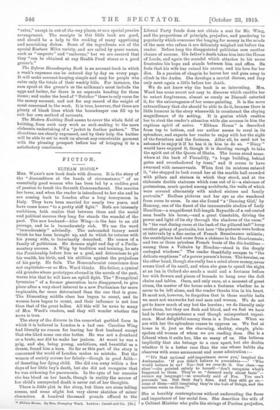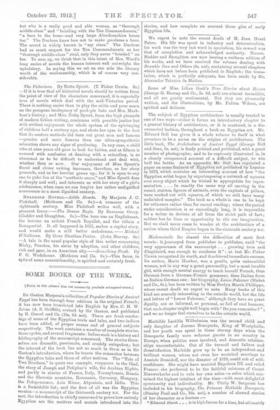FICTION.
ELTHAM HOUSE.*
Mae. WA.R.D'ES new book deals with divorce. It is the story of the "discomfiture at the bands of circumstance" of an essentially good woman who has been led by a sudden gust of passion to break the Seventh Commandment. She marries her lover, and when the reader is introduced to her she and he are coming back to London after a long honeymoon in Italy. They have been married for nearly two years, and have come home "to a pretty stiff fight." Both are intensely ambitious, both realize that between them and the social and political success they long for stands the scandal of the past. The new husband—Alec Wing—is the heir to an old peerage, and be is immoderately rich. We use the word " immoderabely " advisedly. The unbounded luxury amid which he has been brought up, and to which he returns with his young wife, is luxuriantly described. He comes of a family of politicians. He dreams night and day of a Parlia- mentary success. A Whig by tradition and training, he sets the Premiership before him as a goal, and determines to pit his wealth, his birth, and his abilities against the prejudices of his party. He fails. The Nonconformist conscience does not capitulate—or so Mrs. Ward thinks. His father, a cynical old grandee whose prototypes abound in the novels of the past, warns him that he will have an uphill fight. The "Evangelical tyrannies" of a former generation have disappeared, to give place after a very short interval to a new Puritanism far more implacable, far more determined than the one that is gone. The Dissenting middle class has begun to count, and its women have begun to count, and their influence is not less than that of the great ladies. All this will be news to many of Mrs. Ward's readers, and they will wonder whether the news is true.
The story of the divorce in the somewhat garbled form in which it is believed in London is a bad one. Caroline Wing bad literally no reason for leaving her first husband except that she liked some one else better. He was not a drunkard or a brute, nor did be make her jealous. At worst he was a prig, and she, being young, ambitious, and beautiful as a dream, found him a bore. So far as this part of the story is concerned the world of London makes no mistake. But the women of society accuse her falsely—though in good faith— of deserting her dying child. She did run away within a few days of her little boy's death, but she did not recognize that he was sickening for pneumonia. In the eyes of her enemies she has blood on her hands, though in reality the sorrow of her child's unexpected death is never out of her thoughts.
There is little plot in the story, but there are some telling scenes, and some slight but very clever sketches of minor characters. A hundred thousand pounds offered to the • • Blihase Mouse, By Mrs. If uraphry Ward. London; Cassell and Co. [6s.] Liberal Party funds does not obtain a seat for Mr. Wing, and the proportions of principle, prejudice, and pandering to popularity which overcome the longing for money in the minds of the men who refuse it are delicately weighed out before the reader. Before long the disappointed politician sees another chance of success. His father's death takes him into the House of Lords, and again the scandal which attaches to his name frustrates his hope and stands between him and office. He feels that his wife has ruined his career, and his love for her dies. In a passion of chagrin he leaves her and goes away to climb in the Andes. She develops a mortal disease, and they only meet again a little before her death.
We do not know why the book is so interesting. Mrs. Ward has some secret not easy to discover which enables her to extort forgiveness, almost as surely as Disraeli extorted it, for the extravagance of her scene-painting. It is the more extraordinary that she should be able to do it, because there is little humour in the story wherewith to counteract the cloying magnificence of its setting. It is genius which enables her to rivet the reader's attention while she arouses in him the captious spirit of satire. " Eltham House" is described from top to bottom, and our author seems to revel in its
splendour, and expects her reader to enjoy with her the sight of the furniture and the footmen. After all, he need not be ashamed to enjoy it if he has it in him to do so. "Dizzy " would have enjoyed it, though it is dazzling enough to take
the spirit out of the Queen of Sheba. The house stood some- where at the back of Piccadilly, "a huge building, behind gates and overshadowed by trees," and it seems to have swarmed with menservants. When first its mistress entered it, "she stopped to look round her at the marble hall crowded with pillars and statues in which they stood, and at the elaborate double staircase which rose out of it—a staircase of pretensions, much quoted among architects, the walls of which
were covered alternately with niched statues and family portraits." Endless pictures met her eye as she wandered from room to room. In one she found " a 'Dancing Girl,' by Romney, one of the finest of the innumerable studies of Lady Hamilton—a magnificent full-length Reynolds of a red-coated man beside his horse,—and a great Constable, driving the power and light of its sky through the shadows of the room."
In " the vast dining-room at the back of the pillared hall" hung another galaxy of portraits, but hero " the pictures were broken at intervals by a fine series of French Renaissance cabinets ; the mantelpiece had come from a chiteau in the Bourbonnais; and two or three priceless French busts of the dix-huitietne-
among them a Voltaire by Houdon—stood in the deeply embayed windows." The reader thankfully escapes to "the
delicate emptiness " of a poorer person's house. The heroine, on the other hand, though she really has a mind above money,never seems tired of its smell, and when she goes to spend the night at an inn in Oxford she sends a maid and a footman before her with flowers and pieces of brocade to hang over the dull chairs and tables. Once, and only once, at a moment of great stress, the master of the house asks a footman whether he is never to be left alone, and the reader thanks him in his heart. It must not, however, be forgotten that in these marble halls we meet not waxworks but real men and women. We do not get to know much of any but the heroine ; we do literally only meet them, but they are flesh and blood, and we feel we have had in their acquaintance a real though unimportant experi-
ence. Most delightful among them is a Duchess. When we are with her the splendour ceases to oppress us. We feel at home in it, just as the charming, shabby, simple, plain- spoken old woman of whom we are reading does. She is a Liberal when it suits her, like so many of us. She believes implicitly that she belongs to a race apart, but she doubts whether it is a better race than the one whose habits she observes with some amusement and some admiration :-
"`It's that national self-importance saves you,' laughed the Ambassador. If you didn't believe in yourselves—' 'Who would believe in us P Yes—but wo over-do it. Our class—my class '—she pointed calmly to herself= don't recognize what's happened to them. They're so "damned surly about facts "— excuse my language !--as somebody said of Fox. You can't persuade 'em. But their day's done. And they still go on— some of them—still imagining they're the hub of things, and the universe waits on them.' "
She is horribly contemptuous without underrating the force and importance of her social foes. She describes the wife of a Cabinet Minister who pulls the strings of Puritan prejudice, but who is a really good and able woman, as "thorough middle-class" and "bristling with the Ten Commandments," "a bore to the bone—and very large Aberdeenshire bones too." The Duchess knew how not to make goodness a bore. The secret is widely known in "my class." The Duchess bad as much respect for the Ten Commandments as her "thorough middle-class " rival, only they never " bristled " on her. To sum up, we think that in this latest of Mrs. Ward's long series of novels the human interest well outweighs the upholstery. In saying this we set on one side the literary worth of the workmanship, which is of course very con- siderable.







































 Previous page
Previous page